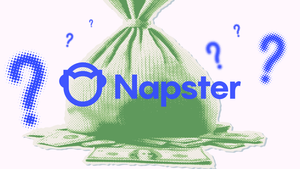A number of record labels and music distributors are reportedly considering pulling their catalogues from the Napster streaming service due to late royalty payments, with some rightsholders telling Billboard that they are now experiencing payment delays of over a year.
It follows the news last month that Sony Music was pulling its recordings from African streaming service Boomplay, also because of late royalty payments.
Both developments are a reminder that operating a music streaming service is challenging until you have a very large premium subscriber base, given the business model involves paying up to 70% of revenue over to the music industry every month. Boomplay has a much bigger total user-base than Napster, although offers a free tier.
Billboard says that at least half a dozen labels and distributors have now expressed frustration about late payments from Napster, with delays seemingly varying from a few months to over a year. One source added that, for a long time now, the service has “cited fundraising struggles as an excuse for delayed royalty payments”.
Napster is still best known for the controversial and short-lived file-sharing network that first used the brand back in 1999.
After that business was sued into bankruptcy by the record industry for its role in facilitating rampant music piracy, the brand was acquired and used for a licensed subscription-based download service. That then later morphed into a streaming service operating a similar business model to Spotify.
Along the way the Napster company was acquired by US retailer Best Buy, and then merged with Rhapsody, an early player in the streaming market in the US which relaunched its own service using the Napster name.
However, despite it using a well known brand, and Rhapsody having a headstart in the US market, the legit Napster platform failed to gain much traction when the music streaming business started to boom in the mid-2010s, although the company had some success as a B2B provider powering other people’s music services.
In more recent years, the Napster company has sought to capitalise on new technologies, or at least the hype surrounding new technologies, mainly as a result of being acquired by new owners focused on buzzy digital trends.
In 2020, there was all sorts of virtual reality talk after Napster was acquired by concert VR app MelodyVR. Then, in 2022, crypto companies Hivemind and Algorand bought the business and started hyping up Web3 ambitions, with former Roblox music boss Jon Vlassopulos being appointed as CEO. It’s almost a wonder the company hasn’t been snapped up by a music AI start-up in the last year.
But despite the buzzy bandwagon jumping, the core Napster product remains the streaming service everyone forgets still exists, alongside its B2B offering. That obviously relies on it continuing to have access to the music industry’s catalogue.
In the wider scheme of things, the music industry’s income from Napster is pretty modest, but nevertheless labels and distributors obviously still need to be paid when their music is played.
Napster has not yet commented on the reports of late payments. Meanwhile, we await to see if any catalogues are actually removed from the platform.

